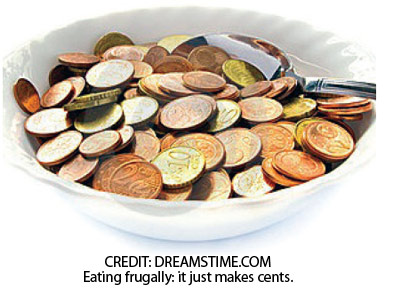Nutrition Ambition: From ramen to riches

Notorious B.I.G. once said, "Mo money, mo problems." As much as they might admire "Big Poppa" himself, most of today's college students would disagree on this point.
Certainly, it seems that many of our problems today are caused by a lack of money, not the contrary. Many students attempt to compensate for their low budgets by buying those cheap, over-processed foods that are commonly found on sale in any convenience store. Unfortunately, the foods that tend to be the cheapest and require the least preparation are often the worst for our health.
There are ways for students to save cash on food without sacrificing taste or nutrition. The following 10 foods will keep both your stomach and bank account full for longer.
Stock up on:
1. Eggs
2. Tuna
3. Beans
4. Potatoes/Sweet Potatoes
5. Whole Wheat Pasta
6. Whole Wheat Rice
7. Frozen Vegetables
8. Canned Tomatoes
9. Peanut Butter
10. Bananas
Not only are these foods inexpensive, many of them are also considered staples at grocery stores. This is important for students who don't have time to travel around in search of specialty diet foods. As for brand-names, the discount/ no-name brand will generally be just as good when it comes to these foods. However, if you prefer free-range eggs or are hooked on a specific label of peanut butter, it may benefit you to check out flyers and stock up when there are good sales.
These 10 low-cost foods also provide endless easy home-dining options. You are only limited by your creativity. For example, eggs, a notorious breakfast food, can be mixed with your canned tomatoes, favourite vegetables and sprinkled with some grated cheddar cheese to create a cheap and high protein meal appropriate for any time of day. Chop up those potatoes, et voil�: home fries (minus the cafeteria costs) on the side.
Peanut butter and banana sandwiches were Elvis' favourite for a reason. Peanut butter (used sparingly) makes an excellent, nutritionally dense addition for those who are short on time and prefer to snack on the go. Bananas, though relatively high in carbohydrates for a fruit, provide an unbeatable source of potassium and vitamins. They are also highly portable, so you can bring them to school to stave off hunger between classes, saving you money and the guilt that comes from scarfing down a donut on the way to your next tutorial.
Pasta, rice and vegetables are basics for easy and inexpensive student dinners. Buying whole wheat options gives you more bang for your buck, as these grains keep you feeling full and satisfied longer. Frozen vegetables (once thawed) are convenient, low in calories and high in vitamins. You can add them to enhance virtually any dinner dish and you may even find yourself eating less, due to the high water and fibre content.
Eating economically may seem difficult at first, but it's easy once you get down to the basics (and I don't mean Kraft Dinner). With these foods, you can eat up while you save up... the only thing getting fatter will be your wallet.













